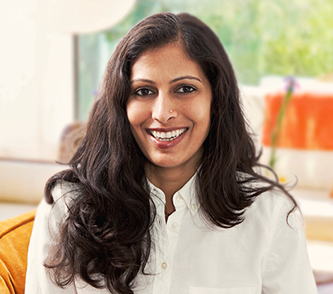As a second-generation immigrant woman in my late teens and early 20s, I envisioned myself having an amazing career by day, and being home feeding my family a full Gujarati dinner consisting of rice, curry, subji, and roti by night. It didn’t occur to me that my vision would be particularly difficult, that I might be short on the time, energy, and resources to make it happen regularly. I didn’t realize I had to be Superwoman to make it come true.
No one ever had “The Talk” with me. The talk that I believe every young woman should be given. The talk that could prevent depression, anxiety, divorce, overindulgent alcohol, money or food consumption. The talk that can prevent an overall loss of identity and connection. The talk about self-preservation.
Today, I’m going to have this talk with you. Times have changed, yet how women are seen in society hasn’t changed as much. In order to not only survive, but also thrive, we must be cognizant of the concept of self-preservation, how to survive in a world that demands so much from us. My approach to self-preservation includes three aspects: understanding the necessity of self-care, critically examining your expectations, and cultivating your gifts to this world.
Understanding The Necessity of Self-Care
Self-care is essential for everyone who gives to others. Even machines need care; it is called maintenance. We cannot function long term without taking care of ourselves. Not only that, but we cannot thrive in what we do if we don’t take superior care of ourselves. If we want to go out there and change the world, we NEED to invest time, energy, and resources into nurturing ourselves.
As my life progressed, I seemed to put self-care at the bottom of my list: getting married, developing my career, buying a house, having children. All these things added tasks to my list, and the urgency of these tasks seemed greater than self-care. My self-care practices fell by the wayside. While on mat leave with my second child, I was FaceTiming with my childhood friend. She told me I just sounded different. She asked me if I’ve been tested for Postpartum Depression. I couldn’t believe that I had been so removed from my own wellbeing that someone who knows me well was concerned for me, and that I hadn’t even noticed. It was a wake up call for me. I got the support I needed and rerouted my path back to practicing regular self-care. That conversation shifted the trajectory, not only of my personal life, but also my professional life.
My main takeaway: In order to care for others effectively, it is essential to care for yourself. If you continue your life running at bare minimum care, you will never reach your potential, and do a disservice to yourself and the ones you serve.
Critically Examining Your Expectations
With the women’s rights movement, the number of women with careers has risen. In fact, since 1948, women in the labor force in the United States has consistently increased, and was at 56.8% in 2016 (Dewolf, 2017). However, the same year, the percentage of women aging between 40 and 44 who were childless was 14.4% (Statista, 2018). This includes involuntary childlessness. That means 85.6% of women between the ages of 40 and 44 in 2016 were mothers. While it has oscillated throughout the years, it has not significantly changed. What has changed is the age of becoming a first time mother. Even now, having children is just something women are expected to do. Many of us haven’t questioned it, even though it has been proven as the number one reason for the gender wage gap.
If something as life altering as becoming a mother with a career isn’t properly examined, what smaller roles and responsibilities are we taking on without a proper evaluation or critical eye? While having both major roles is achievable, each role comes with a plethora of expectations, some of which shouldn’t apply everyone. If we don’t start to discern these expectations, eventually our plates get overloaded, and we become overwhelmed.
My main takeaway: We should not blindly accept expectations just because our elders, peers, or society have given them to us. It is essential for us to analyze the legitimacy and appropriateness of each expectation to ensure we are not expending our energy carelessly, without purpose or need.
Cultivating Your Gifts to The World
Consider that the phrase, “Jack of all trades,” ends with “Master of none.” This seems like a recipe for low self-worth. Instead, I’ve chosen to be a queen of some trades! This means I focus on the skills I do well and enjoy. These are the offerings I willingly share with those around me. This collection of abilities is what makes me special and valuable to those I share with. I might have to do other things, yes, but I do them at a bare minimum, with the goal of “good enough.” I don’t volunteer myself to do more of those tasks for others, nor do I base my self-worth on them.
Imagine what Alexander Graham Bell would think if he saw a smartphone? The invention of the telephone was a game changer in keeping people connected. Instead of corresponding by letter and waiting for weeks to communicate to loved ones far away, we could have instantaneous conversations with each other. It became an essential vehicle to maintain relationships, and stay engaged. However, the evolution of the phone, with contributions from social media, has done the opposite. We are more disengaged with others than before. We prefer to connect with screens instead of people. I recently went to hear a speaker talk about authenticity, and as I looked around the room, I noticed more than half the audience was on the phone. We paid to hear this woman speak, and many of us could not let go of the tether of the screen. Today, our phones are used for so many things, that the gift it was meant to give is diminished. The smartphone has become a jack of all trades.
My main takeaway: I encourage you to search for your gifts, and become a queen of some trades. As you learn to embrace what makes you uniquely valuable, others will follow suit.
In Conclusion
If you acknowledge these factors now, then you can be more clear about what you have to offer to the world and be able to create and implement boundaries before you would even need them. Then you can find appropriate alliances in your life, and build relationships that are symbiotic. When we hone in on what we have an affinity for, we present a more authentic self. We not only show our true value, but we also express humility, and demonstrate that no one is meant to be amazing at everything. This display of vulnerability collectively takes the pressure to be Superwoman off all women.
I hope this talk doesn’t come to you late, and you can implement some of these ideas in your life. As well, if you know a young adult woman, I encourage you to have this talk with her, so she can have a more realistic and fulfilling vision for her future.
References
Dewolf, M. (2017). 12 stats about working women. US department of labour blog. Retrieved from https://blog.dol.gov/2017/03/01/12-stats-about-working-women
(Dewolf, 2017)
Statista. (2018). Percentage of childless women in the United States in 2016, by age. Retrieved from https://www.statista.com/statistics/241535/percentage-of-childless-women-in-the-us-by-age/
(Statista, 2018)



